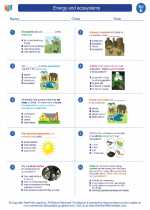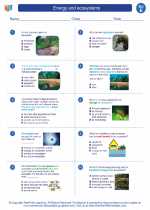Energy and Ecosystems
Energy is a crucial component of ecosystems, as it is essential for the functioning and survival of all living organisms within an ecosystem. Here is a study guide to help you understand the relationship between energy and ecosystems:
What is an ecosystem?
An ecosystem is a community of living organisms (plants, animals, and microorganisms) in conjunction with the nonliving components of their environment (such as air, water, and mineral soil), interacting as a system.
How is energy transferred in ecosystems?
Energy flows through ecosystems in a one-way stream, typically from the sun, to producers (plants), and then to consumers (animals). This flow of energy sustains the organisms within the ecosystem and drives the various ecological processes.
What is the role of producers in an ecosystem?
Producers, such as plants, algae, and some bacteria, are organisms that can capture energy from sunlight or inorganic compounds and convert it into chemical energy through the process of photosynthesis. This energy is then stored in the form of organic compounds.
How do consumers obtain energy in an ecosystem?
Consumers are organisms that rely on other organisms for energy. There are several types of consumers, including herbivores (which eat plants), carnivores (which eat other animals), and omnivores (which eat both plants and animals). These consumers obtain energy by consuming producers or other consumers.
What happens to energy as it moves through the food chain?
As energy moves through the food chain, a significant portion of it is lost at each trophic level through metabolic processes, heat production, and waste. This loss of energy explains why there are generally fewer top-level predators in an ecosystem compared to the number of producers and primary consumers.
How is energy cycled and recycled in ecosystems?
Energy is cycled and recycled in ecosystems through processes such as decomposition and nutrient cycling. Decomposers, such as bacteria and fungi, break down organic matter and release nutrients back into the environment, allowing the energy stored in organic compounds to be reused by producers.
Why is energy important in maintaining the balance of ecosystems?
Energy is essential for maintaining the balance and stability of ecosystems. It influences the population dynamics, interactions between organisms, and the overall health of the ecosystem. Understanding energy flow in ecosystems is crucial for conservation and management efforts.
By understanding the role of energy in ecosystems, we can appreciate the intricate relationships that exist within natural environments and the importance of maintaining a balance for the sustainability of life on Earth.
.◂Science Worksheets and Study Guides Fifth Grade. Energy and ecosystems

 Worksheet/Answer key
Worksheet/Answer key
 Worksheet/Answer key
Worksheet/Answer key
 Worksheet/Answer key
Worksheet/Answer key
 Vocabulary/Answer key
Vocabulary/Answer key
 Vocabulary/Answer key
Vocabulary/Answer key
 Vocabulary/Answer key
Vocabulary/Answer key
